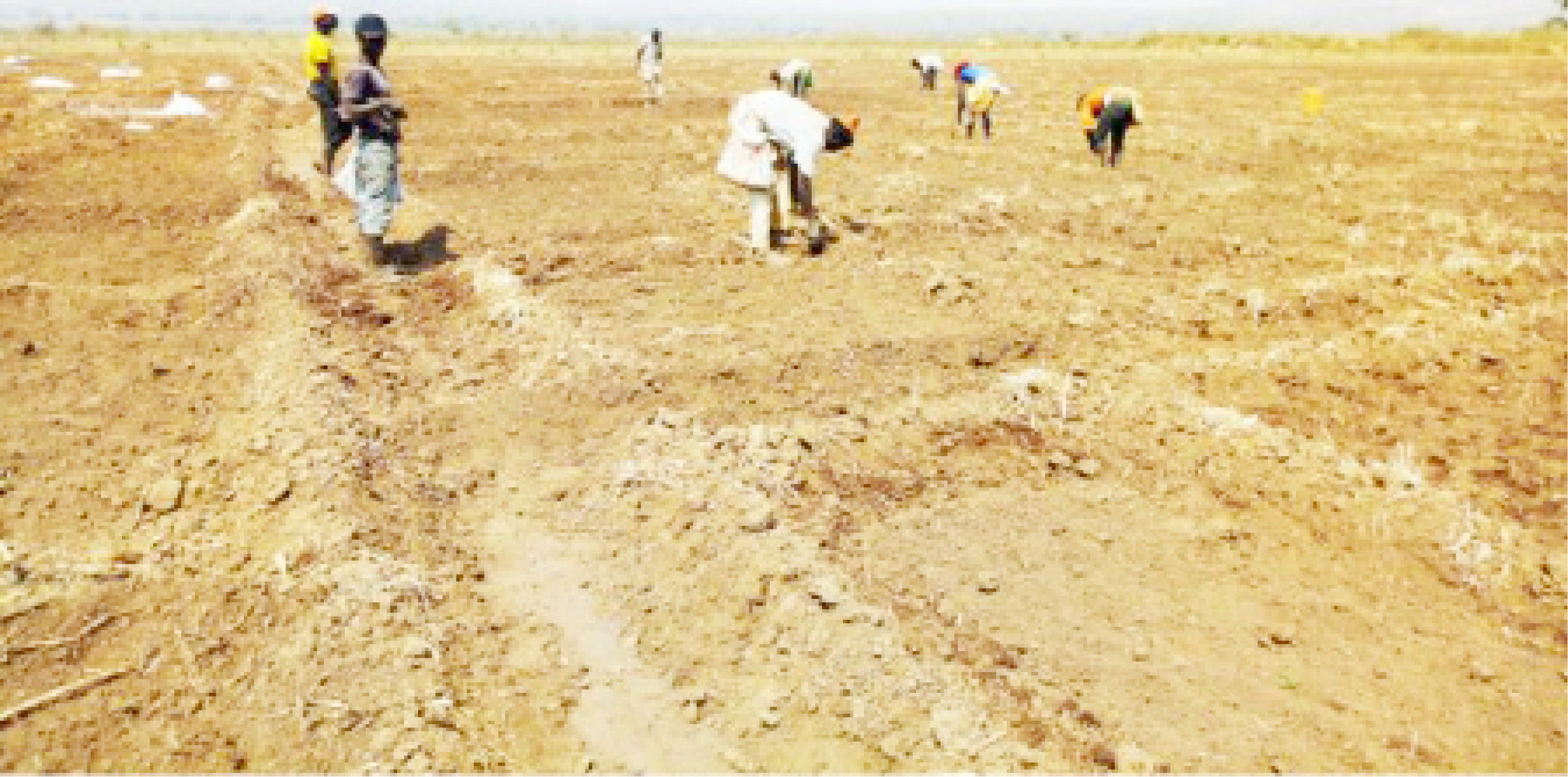Fear of ‘dry spell’ grips Yobe farmers
The long period of dry weather which caused crops that germinate early to wither has left farmers in Yobe State expressing serious concern this farming season. Farmers who spoke to Daily Trust complained that unsettled rainfall pattern is discouraging many of them from investing more money and effort into their farms. Ahmed Ibrahim, a civil […]

The long period of dry weather which caused crops that germinate early to wither has left farmers in Yobe State expressing serious concern this farming season.
Farmers who spoke to Daily Trust complained that unsettled rainfall pattern is discouraging many of them from investing more money and effort into their farms.
Ahmed Ibrahim, a civil servant and farmer in Damaturu, said the situation is making farmers to reconsider investing in their farmlands.
“In fact, with this dry spell that we have started experiencing, coupled with crash in grains prices, many farmers are no longer investing much into their fields, some have instead started buying grains to store.
“Last year around this time, a bag of beans and sorghum cost N32,000 and N11000 respectively but now they have crashed to N9000 and N4000 this season. The situation has affected many farmers that stored such grains to sell and raise money to finance their farming activities,” he said.
Ibrahim said the delay in rainfall has also affected farmers that embarked on early planting. “After the first rainfall, some people started planting thinking it will continue to rain but it suddenly ceased and their germinated crops dried up,” he said.
Another farmer, Malam Mamman Yunusa, who cleared 10 hectares of land for cultivation in Damaturu said he cannot risk investing much into the farm.
“After the first rainfall, I cleared 10 hectares of land, hired tractor that will plough the land but everything had to stop due to lack of rainfall. To reduce the risk, I made up my mind to reduce the farm size and pray that the situation will change soon to enable us make the best of the cropping time,” he said.
He said the crash in food crop prices had also forced many farmers in Yobe to resort to cash crops planting this season, to avoid further crash that will make the farming non-profitable.
“Almost every farmer I know has shifted to sesame and groundnut cropping this season. Only few prioritised beans or sorghum and in most cases, mixed cropping”, he said.
Checks by our correspondent in some major markets across the state revealed that the prices of foodstuffs have reduced by up to about 60 percent, while the price of sesame has soared.
In Katarko market, bags of beans and sorghum which few months ago were sold at N12,000 and N32,000 now sell for N4000 and N9000, while a bag sesame that cost N21,000 is now N33,000.
Although many farmers attribute the crash in the price of foodstuff to the bumper harvest recorded last season, experts blame the farmers of using insecticides, which reduced the export value of the food crops in foreign countries.
The state Coordinator, National Agency for Food, Drugs Administration and Control, (NAFDAC), Lawan Musa Dadingelma, said the agency had to embark on surveillance operation to deal with farmers and marketers that were using dangerous chemicals to preserve beans, grains and other farm produce in the state.
He said the farmers’ attitude, if not checked, will destroy the country’s image in agricultural business abroad.
“To safeguard the public and country’s image from the use of the harmful chemicals, our staff are going round cities and villages to inspect stores and make sure that directives are complied with, while those who refused to do so will have their produce confiscated and the law takes its course,” he said.
However, the Federal Government has through its intervention programmes reached out to farmers, especially Internally Displaced Persons (IDPs) in Yobe to ensure self-reliance and enhance agricultural production in the state.
The State Chairman, Northeast Commodity Association, (NECAS) Hon. Nuhu Baba Hassan, said the Federal Government’s interventions had encouraged farmers to fully embrace agriculture in the state.
“The problem is the delay in rainfall. The farm inputs supplied by the Federal Government arrived earlier enough, and we started distribution under the Anchor Borrower scheme,” he said.
He also noted that the Federal Government recently supplied tractors to ease high cost of hiring the machines by farmers to harrow their fields.
Hon Hassan said last year, 5002 farmers benefited from the Anchor Borrower programme, adding that the beneficiaries cultivated 11,332 hectares of land in 16 local government areas in the state.
“Seventy per cent of last year’s loans have been recovered and the recovery of the remaining percentage is still ongoing,” he said.
He said similar interventions have been made to 13,992 rice irrigation farmers across the state.
Hassan said, to complement what the Federal Government is doing, Yobe State governor, Mai Mala Buni, had during his inauguration speech promised to pay attention to agricultural programmes that would exploit the potentials of irrigation farming.
